英文版传统节日介绍
介绍中国传统节日的英语作文10篇
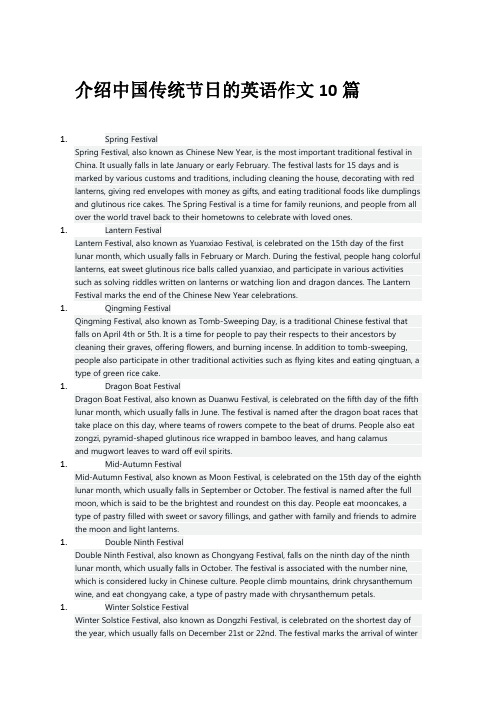
介绍中国传统节日的英语作文10篇1.Spring FestivalSpring Festival, also known as Chinese New Year, is the most important traditional festival in China. It usually falls in late January or early February. The festival lasts for 15 days and ismarked by various customs and traditions, including cleaning the house, decorating with red lanterns, giving red envelopes with money as gifts, and eating traditional foods like dumplings and glutinous rice cakes. The Spring Festival is a time for family reunions, and people from all over the world travel back to their hometowns to celebrate with loved ones.ntern FestivalLantern Festival, also known as Yuanxiao Festival, is celebrated on the 15th day of the first lunar month, which usually falls in February or March. During the festival, people hang colorful lanterns, eat sweet glutinous rice balls called yuanxiao, and participate in various activities such as solving riddles written on lanterns or watching lion and dragon dances. The Lantern Festival marks the end of the Chinese New Year celebrations.1.Qingming FestivalQingming Festival, also known as Tomb-Sweeping Day, is a traditional Chinese festival that falls on April 4th or 5th. It is a time for people to pay their respects to their ancestors bycleaning their graves, offering flowers, and burning incense. In addition to tomb-sweeping, people also participate in other traditional activities such as flying kites and eating qingtuan, a type of green rice cake.1.Dragon Boat FestivalDragon Boat Festival, also known as Duanwu Festival, is celebrated on the fifth day of the fifth lunar month, which usually falls in June. The festival is named after the dragon boat races that take place on this day, where teams of rowers compete to the beat of drums. People also eat zongzi, pyramid-shaped glutinous rice wrapped in bamboo leaves, and hang calamusand mugwort leaves to ward off evil spirits.1.Mid-Autumn FestivalMid-Autumn Festival, also known as Moon Festival, is celebrated on the 15th day of the eighth lunar month, which usually falls in September or October. The festival is named after the full moon, which is said to be the brightest and roundest on this day. People eat mooncakes, a type of pastry filled with sweet or savory fillings, and gather with family and friends to admire the moon and light lanterns.1.Double Ninth FestivalDouble Ninth Festival, also known as Chongyang Festival, falls on the ninth day of the ninth lunar month, which usually falls in October. The festival is associated with the number nine, which is considered lucky in Chinese culture. People climb mountains, drink chrysanthemum wine, and eat chongyang cake, a type of pastry made with chrysanthemum petals.1.Winter Solstice FestivalWinter Solstice Festival, also known as Dongzhi Festival, is celebrated on the shortest day of the year, which usually falls on December 21st or 22nd. The festival marks the arrival of winterand the beginning of longer days. People eat tangyuan, glutinous rice balls filled with sweet or savory fillings, and make offerings to ancestors and deities.1.Ghost FestivalGhost Festival, also known as Hungry Ghost Festival, falls on the 15th day of the seventh lunar month, which usually falls in August or September. The festival is a time to pay respects to the deceased and appease wandering ghosts. People offer food, incense, and paper money to the ghosts and perform traditional rituals to ward off bad luck.ba FestivalLaba Festival falls on the eighth day of the twelfth lunar month, which usually falls in January.The festival is named after the porridge, or laba porridge, that is traditionally eaten on this day.The porridge is made with rice, beans, and various nuts and fruits, and is believed to bring good luck and fortune for the coming year.1.Zhongyuan FestivalZhongyuan Festival, also known as Ghost Month, is a month-long festival that falls on the fifteenth day of the seventh lunar month, which usually falls in August or September. Thefestival is similar to the Ghost Festival, but is a more extended period of time where people pay respects to the deceased and offer food, incense, and paper money to the ghosts. People also perform traditional rituals to ward off bad luck during this time。
英文版传统节日介绍

传统节日中英文介绍。
传统节日中英文介绍。
1、 腊八节腊八节是指农历的腊月初八。
在这天,中国人有喝腊八粥的习俗。
一般腊八粥是甜味粥,里面有干果和干鲜果品,当然每家的腊八粥做法都不营养,在我们家的腊八粥里一般有红小豆,香米,核桃,花生,小米等等。
豆,香米,核桃,花生,小米等等。
过了腊八节,各家就开始置办年货,打扫卫生,正式开始为春节的到来做准备了。
过了腊八节,各家就开始置办年货,打扫卫生,正式开始为春节的到来做准备了。
the laba Rice Porridge Festival“Laba Laba Festival” Festival” Festival” falls falls falls on on on the the the eighth day eighth day of of the twelfth the twelfth month month in in in lunar lunar lunar calendar. calendar. calendar. On On On that that that day, day, the majority Chinese have long followed the tradition of eating Laba rice rice porridge. porridge. porridge. Usually, Usually, Usually, the the rice porridge tastes sweet, with nuts and dried fruit, but different families have different ingredients in the porridge. My family usually make porridge with small red beans ,fragrant rice ,walnut ,peanut and millet. Laba Festival also marks the beginning of preparing for spring festival. Some families begin to do spring festival shopping and clean their houses after that day. 2、小年小年又叫“祭灶节”,在农历的12月23或者24。
介绍中国传统节日的英语

介绍中国传统节日的英语1、Spring Festival:The Spring Festival is the most important festival for the Chinese people and is when all family members get together, just like Christmas in the West.All people living away from home go back, becoming the busiest time for transportation systems of about half a month from the Spring Festival. Airports, railway stations and long-distance bus stations are crowded with home returnees.春节:春节是中国人民最重要的节日,所有家庭成员聚在一起,在西方圣诞节一样。
所有远离家乡的人都要回家,成为了为期半个月左右的运输系统最繁忙的时间春运。
机场、火车站和长途巴士站都挤满了回家的人。
2、Lantern Festival:The first month is the first month of the lunar calendar. The ancient Han nationality called the night "Xiao", so it was called the Lantern Festival on the fifteenth day of the first lunar month.The 15th of the first lunar month is the night of the first full moon of the year, and it is also the night when the whole world returns to spring. People celebrate this and also celebrate the continuation of the New year. The Lantern Festival is also known as the Lantern Festival.元宵节:正月是农历的元月,古代汉族称夜为“宵”,所以称正月十五为元宵节。
中国传统节日的英语作文【优秀4篇】
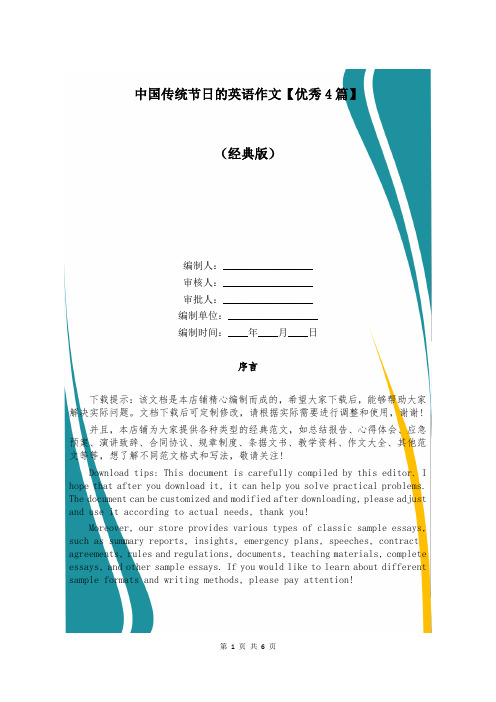
中国传统节日的英语作文【优秀4篇】(经典版)编制人:__________________审核人:__________________审批人:__________________编制单位:__________________编制时间:____年____月____日序言下载提示:该文档是本店铺精心编制而成的,希望大家下载后,能够帮助大家解决实际问题。
文档下载后可定制修改,请根据实际需要进行调整和使用,谢谢!并且,本店铺为大家提供各种类型的经典范文,如总结报告、心得体会、应急预案、演讲致辞、合同协议、规章制度、条据文书、教学资料、作文大全、其他范文等等,想了解不同范文格式和写法,敬请关注!Download tips: This document is carefully compiled by this editor. I hope that after you download it, it can help you solve practical problems. The document can be customized and modified after downloading, please adjust and use it according to actual needs, thank you!Moreover, our store provides various types of classic sample essays, such as summary reports, insights, emergency plans, speeches, contract agreements, rules and regulations, documents, teaching materials, complete essays, and other sample essays. If you would like to learn about different sample formats and writing methods, please pay attention!中国传统节日的英语作文【优秀4篇】根据中文大意和英语提示词语,写出意思连贯、符合逻辑、不少于60词的短文。
中国传统节日英语知识
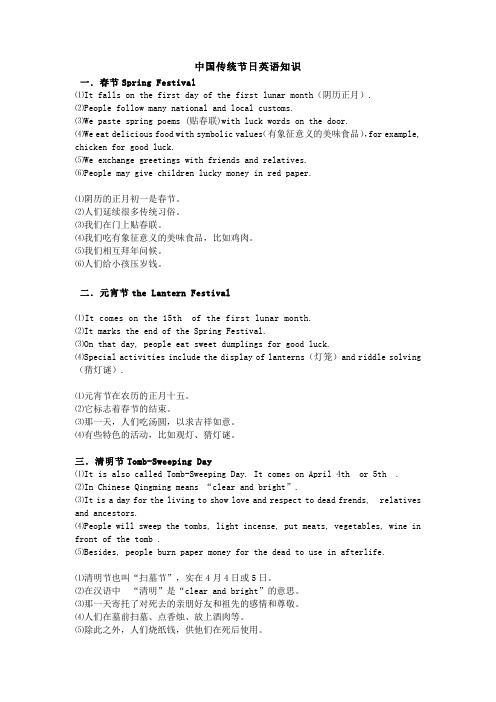
中国传统节日英语知识一.春节Spring Festival⑴It falls on the first day of the first lunar month(阴历正月).⑵People follow many national and local customs.⑶We paste spring poems (贴春联)with luck words on the door.⑷We eat delicious food with symbolic values(有象征意义的美味食品),for example, chicken for good luck.⑸We exchange greetings with friends and relatives.⑹People may give children lucky money in red paper.⑴阴历的正月初一是春节。
⑵人们延续很多传统习俗。
⑶我们在门上贴春联。
⑷我们吃有象征意义的美味食品,比如鸡肉。
⑸我们相互拜年问候。
⑹人们给小孩压岁钱。
二.元宵节the Lantern Festival⑴It comes on the 15th of the first lunar month.⑵It marks the end of the Spring Festival.⑶On that day, people eat sweet dumplings for good luck.⑷Special activities include the display of lanterns(灯笼)and riddle solving (猜灯谜).⑴元宵节在农历的正月十五。
⑵它标志着春节的结束。
⑶那一天,人们吃汤圆,以求吉祥如意。
⑷有些特色的活动,比如观灯、猜灯谜。
三.清明节Tomb-Sweeping Day⑴It is also called Tomb-Sweeping Day. It comes on April 4th or 5th .⑵In Chinese Qingming means “clear and bright”.⑶It is a day for the living to show love and respect to dead frends, relatives and ancestors.⑷People will sweep the tombs, light incense, put meats, vegetables, wine in front of the tomb .⑸Besides, people burn paper money for the dead to use in afterlife.⑴清明节也叫“扫墓节”,实在4月4日或5日。
中国传统节日英文介绍
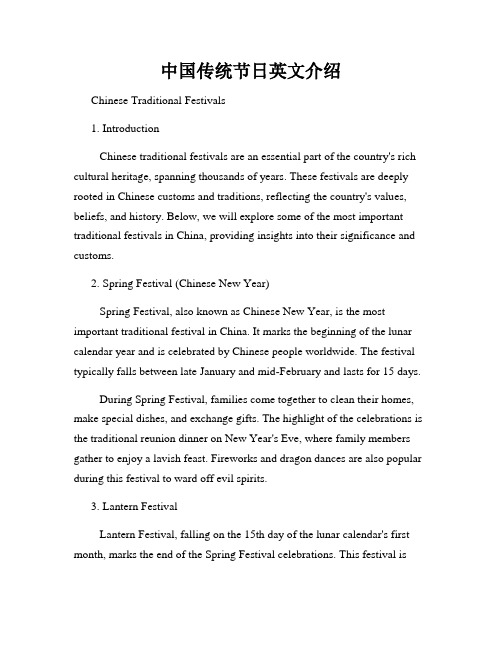
中国传统节日英文介绍Chinese Traditional Festivals1. IntroductionChinese traditional festivals are an essential part of the country's rich cultural heritage, spanning thousands of years. These festivals are deeply rooted in Chinese customs and traditions, reflecting the country's values, beliefs, and history. Below, we will explore some of the most important traditional festivals in China, providing insights into their significance and customs.2. Spring Festival (Chinese New Year)Spring Festival, also known as Chinese New Year, is the most important traditional festival in China. It marks the beginning of the lunar calendar year and is celebrated by Chinese people worldwide. The festival typically falls between late January and mid-February and lasts for 15 days.During Spring Festival, families come together to clean their homes, make special dishes, and exchange gifts. The highlight of the celebrations is the traditional reunion dinner on New Year's Eve, where family members gather to enjoy a lavish feast. Fireworks and dragon dances are also popular during this festival to ward off evil spirits.3. Lantern FestivalLantern Festival, falling on the 15th day of the lunar calendar's first month, marks the end of the Spring Festival celebrations. This festival ischaracterized by the display of colorful lanterns and various cultural activities.People often write riddles on their lanterns for others to solve, adding an element of fun and intellectual challenge to the festival. The iconic lanterns take many forms, including those shaped like animals, flowers, or famous landmarks. Watching the lanterns light up the night sky is a mesmerizing experience.4. Dragon Boat FestivalThe Dragon Boat Festival, also known as Duanwu Festival, is celebrated on the fifth day of the fifth lunar month. This festival commemorates the famous poet Qu Yuan and is characterized by the exciting racing of dragon boats.Dragon boat races involve teams of rowers paddling vigorously to the beat of a drum, competing to reach the finish line first. These races attract huge crowds of spectators who cheer and encourage the participants. Another significant tradition of this festival is the consumption of sticky rice dumplings called zongzi, which are wrapped in bamboo leaves.5. Mid-Autumn FestivalThe Mid-Autumn Festival, also known as the Moon Festival, is celebrated on the 15th day of the eighth lunar month. This festival is a time for family reunions and the appreciation of the full moon's beauty.The festival is closely associated with the legend of Chang'e, a celestial being who resides on the moon. During this festival, people gather to enjoy mooncakes, round pastries filled with various sweet or savory fillings.Lanterns in the shape of the moon are also prevalent during this festival, adding to the festive atmosphere.6. ConclusionChinese traditional festivals are not only grand celebrations but also an embodiment of the Chinese people's cultural identity and historical roots. Through these festivals, people reaffirm their bonds with family, pay respects to ancestors, and pass down customs and traditions to future generations.As China continues to modernize, it remains essential to preserve and cherish these traditional festivals as they play a vital role in maintaining cultural cohesion and fostering a sense of national unity. By understanding and appreciating these festivals, one can gain a deeper insight into the rich cultural tapestry of China.。
英语传统节日介绍简短
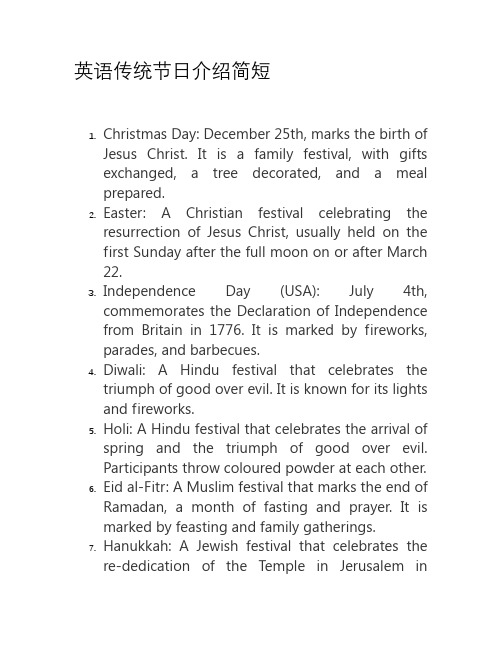
英语传统节日介绍简短1.Christmas Day: December 25th, marks the birth ofJesus Christ. It is a family festival, with gifts exchanged, a tree decorated, and a meal prepared.2.Easter: A Christian festival celebrating theresurrection of Jesus Christ, usually held on the first Sunday after the full moon on or after March22.3.Independence Day (USA): July 4th,commemorates the Declaration of Independence from Britain in 1776. It is marked by fireworks, parades, and barbecues.4.Diwali: A Hindu festival that celebrates thetriumph of good over evil. It is known for its lights and fireworks.5.Holi: A Hindu festival that celebrates the arrival ofspring and the triumph of good over evil.Participants throw coloured powder at each other.6.Eid al-Fitr: A Muslim festival that marks the end ofRamadan, a month of fasting and prayer. It is marked by feasting and family gatherings.7.Hanukkah: A Jewish festival that celebrates there-dedication of the Temple in Jerusalem inancient times. It is marked by eight days of festivities and the lighting of a menorah.8.Navratri: A Hindu festival that celebrates the goddess Durga and her nine avatars. It is known for its devotional music and dance.9.Chinese New Year: The Chinese calendar's new year, usually falling between January 21 and February 20. It is marked by family gatherings, fireworks, and the giving of red envelopes.10.Mardi Gras: A festival in New Orleans, Louisiana, USA, that marks the last day of Carnival before Lent. It is known for its parades and costumes.。
中国传统节日介绍英文版

国家或国际节日元旦 New Year' s Day Jan.1国际劳动妇女节 International Working women' s Day(wornen's Day) Mar.8国际劳动节 nternatlonal Labor Day(May. Day) May.1中国青年节 Chinese Youth Day May.4国际儿童节 International Children's Day(Children's Day) June .1中国共产党诞生纪念日( 党的生日) Anniversary of the Foundlng of the ChineseCommunist Party ( the Party' s Birthday) July .1建军节 Army Day August .1教师节 Teachers , Day Sept.1国庆节 National Dey October.1中国传统节日春节 the Sprlng Festival ( NewYearls Day of the Chinese lunar calendar)农历正月初一元宵节(灯节) the Lantern Festival 农历正月十五清明节 the Qing Ming Festival 四月五日前后端午节 the Dragon-Boat Festiva 农历五月初五中秋节 the MidAutumn Festival(the Moon Festival)农历八月十五重阳节 the Double Ninth Festival 农历九月初九元旦(1月1日)NewYear'sDay春节(农历一月一日)theSpringFestival元宵节(农历一月十五日)theLanternFestival国际劳动妇女节(3月8日)InternationalWorkingWomen'sDay植树节(3月12日)ArborDay邮政节(3月20日)PostalDay世界气象节(3月23日)WorldMeteorologyDay清明节(4月5日)ChingMingFestival;Tomb-sweepingFestival国际劳动节(5月1日)InternationalLabourDay中国青年节(5月4日)ChineseYouthDay护士节(5月12日)Nurses'Festival端午节(农历五月初五)theDragonBoatFestival国际儿童节(6月1日)InternationalChildren'sDay中国共产党成立纪念日(7月1日)theParty'sBirthday建军节(8月1日)theArmy'sDay中秋节(农历八月十五)Mid-autumn(Moon)Festival教师节(9月10日)Teachers'Day重阳节(农历九月九日)Double-ninthDay国庆节(10月1日)NationalDay除夕(农历十二月三十日)NewYear'sEve阳历节日1月1日元旦(New Year's Day)2月2日世界湿地日(World Wetlands Day)2月14日情人节(Valentine's Day)3月3日全国爱耳日3月5日青年志愿者服务日3月8日国际妇女节(International Women' Day)3月9日保护母亲河日3月12日中国植树节(China Arbor Day)3月14日白色情人节(White Day)3月14日国际警察日(International Policemen' Day)3月15日世界消费者权益日(World Consumer Right Day)3月21日世界森林日(World Forest Day)3月21日世界睡眠日(World Sleep Day)3月22日世界水日(World Water Day)3月23日世界气象日(World Meteorological Day)3月24日世界防治结核病日(World Tuberculosis Day)4月1日愚人节(April Fools' Day)4月5日清明节(Tomb-sweeping Day)4月7日世界卫生日(World Health Day)4月22日世界地球日(World Earth Day)4月26日世界知识产权日(World Intellectual Property Day)5月1日国际劳动节(International Labour Day)5月3日世界哮喘日(World Asthma Day)5月4日中国青年节(Chinese Youth Day)5月8日世界红十字日(World Red-Cross Day)5月12日国际护士节(International Nurse Day)5月15日国际家庭日(International Family Day)5月17日世界电信日(World Telecommunications Day)5月20日全国学生营养日5月23日国际牛奶日(International Milk Day)5月31日世界无烟日(World No-Smoking Day)6月1日国际儿童节(International Children's Day)6月5日世界环境日(International Environment Day)6月6日全国爱眼日6月17日世界防治荒漠化和干旱日(World Day to combat desertification) 6月23日国际奥林匹克日(International Olympic Day)6月25日全国土地日6月26日国际禁毒日(International Day Against Drug Abuse and Illicit Trafficking) 7月1日中国共产党诞生日(Anniversary of the Founding of the Chinese Communist Party) 7月1日国际建筑日(International Architecture Day)7月7日中国人民抗日战争纪念日7月11日世界人口日(World Population Day)8月1日中国人民解放军建军节(Army Day)8月12日国际青年节(International Youth Day)9月8日国际扫盲日(International Anti-illiteracy Day)9月10日中国教师节(Teacher's Day)9月16日中国脑健康日9月16日国际臭氧层保护日(International Day for the Preservation of the Ozone Layer) 9月20日全国爱牙日9月21日世界停火日(World Cease-fire Day)9月27日世界旅游日(World Tourism Day)10月1日中华人民共和国国庆节(National Day)10月1日国际音乐日(International Music Day)10月1日国际老年人日(International Day of Older Persons)10月4日世界动物日(World Animal Day)10月5日世界教师日(World Teachers' Day)(联合国教科文组织确立)10月8日全国高血压日10月9日世界邮政日(World Post Day)10月10日世界精神卫生日(World Mental Health Day)10月14日世界标准日(World Standards Day)10月15日国际盲人节(International Day of the Blind)10月15日世界农村妇女日(World Rural Women's Day)10月16日世界粮食日(World Food Day)10月17日国际消除贫困日(International Day for the Eradication of Poverty)10月24日联合国日(United Nations Day)10月24日世界发展新闻日(World Development Information Day)10月28日中国男性健康日10月29日国际生物多样性日(International Biodiversity Day)10月31日万圣节(Halloween)11月8日中国记者节11月9日消防宣传日11月14日世界糖尿病日(World Diabetes Day)11月17日国际大学生节11月25日国际消除对妇女的暴力日(International Day For the elimination of Violence against Women)12月1日世界爱滋病日(World AIDS Day)12月3日世界残疾人日(World Disabled Day)12月4日全国法制宣传日12月9日世界足球日(World Football Day)12月25日圣诞节(Christmas Day)12月29日国际生物多样性日(International Biological Diversity Day)1月最后一个星期日国际麻风节3月最后一个完整周的星期一中小学生安全教育日春分月圆后的第一个星期日复活节(Easter Monday)(有可能是3月22-4月25日间的任一天) 5月第二个星期日母亲节(Mother's Day)5月第三个星期日全国助残日6月第三个星期日父亲节(Father's Day)9月第三个星期二国际和平日(International Peace Day)9月第三个星期六全国国防教育日9月第四个星期日国际聋人节(International Day of the Deaf)10月的第一个星期一世界住房日(World Habitat Day)10月的第二个星斯一加拿大感恩节(Thanksgiving Day)10月第二个星期三国际减轻自然灾害日(International Day for Natural Disaster Reduction)10月第二个星期四世界爱眼日(World Sight Day)11月最后一个星期四美国感恩节(Thanksgiving Day)农历节日农历正月初一春节(the Spring Festival)农历正月十五元宵节(Lantern Festival)农历五月初五端午节(the Dragon-Boat Festival)农历七月初七乞巧节(中国情人节)(Double-Seventh Day)农历八月十五中秋节(the Mid-Autumn Festival)农历九月初九重阳节(the Double Ninth Festival)农历腊月初八腊八节(the laba Rice Porridge Festival)农历腊月二十四传统扫房日。
- 1、下载文档前请自行甄别文档内容的完整性,平台不提供额外的编辑、内容补充、找答案等附加服务。
- 2、"仅部分预览"的文档,不可在线预览部分如存在完整性等问题,可反馈申请退款(可完整预览的文档不适用该条件!)。
- 3、如文档侵犯您的权益,请联系客服反馈,我们会尽快为您处理(人工客服工作时间:9:00-18:30)。
传统节日中英文介绍。
1、腊八节腊八节是指农历的腊月初八。
在这天,中国人有喝腊八粥的习俗。
一般腊八粥是甜味粥,里面有干果和干鲜果品,当然每家的腊八粥做法都不营养,在我们家的腊八粥里一般有红小豆,香米,核桃,花生,小米等等。
过了腊八节,各家就开始置办年货,打扫卫生,正式开始为春节的到来做准备了。
the laba Rice Porridge Festival“Laba Festival” falls on the eighth day of the twelfth month in lunar calendar. On that day, the majority Chinese have long followed the tradition of eating Laba rice porridge. Usually, the rice porridge tastes sweet, with nuts and dried fruit, but different families have different ingredients in the porridge. My family usually make porridge with small red beans,fragrant rice,walnut,peanut and millet.Laba Festival also marks the beginning of preparing for spring festival. Some families begin to do spring festival shopping and clean their houses after that day.2、小年小年又叫“祭灶节”,在农历的12月23或者24。
在中国传统中,祭灶节这天,是掌管全家命运的神仙灶神将向玉皇大帝汇报这一家人一年的情况,玉皇大帝根据灶神汇报的情况决定在下一年对这一家的奖励或者惩罚。
小年这天,是各家欢送灶王爷上天的日子。
老百姓在这一天做糖瓜,希望灶神可以吃了糖瓜,多为自己家美言几句,让来年更加吉祥幸福。
Kitchen God's DayKitchen God’s Day falls on the 23rd or 24th of the twelfth month of the lunar year. According to tradition, Kitchen God who in charge of the fate of the whole family goes back to heaven during the spring festival to deliver what the family had done the last year to the Great God. According to Kitchen God’s words, the Great God makes decision to reward or punish the family in the next year. In other words, it is the day people honor the Kitchen God.People usually made sugared melons with malt sugar on that day. We hope Kitchen God will eat sugared melons and put a good word for our family to the Great God, so we’ll be lucky next year.3、春节对中国人来说,春节是最重要的节日。
除夕这天,全家人要一起吃年夜饭。
这是最好的一次家宴,不仅仅因为菜品丰富,更因为这是个全家人相聚的日子。
年夜饭后,我们会一起包饺子,通常会全家人一起看央视春晚。
过年的时候,各家都放鞭炮,贴春联。
还有一件事也很重要,那就是守岁,就是在旧年的最后一天夜里不睡觉,熬夜迎接新一年的到来的习俗。
大年初一,亲戚朋友相互拜年,祝愿新的一年能事事顺利。
通常大人们还会给小孩子发压岁钱。
大年初二回娘家,是指已婚妇女回娘家拜访。
初五这天全家再次团聚吃饺子。
这天是人们要迎接灶王爷下界的日子。
同时,人们打扫卫生,放鞭炮,来驱走“晦气”。
The Spring FestivalThe spring festival is the most important festival for Chinese. At Chinese New Year’s Eve, family members have reunion dinner together. This dinner would be the best dinner, not only because we have various di shes, but it’s the day we could meet all our family members.After family reunion dinner, we make Chinese dumplings together, and usually watch the Spring Festival Gala on CCTV. Each family would light firecrackers and paste up Spring Festival couplets. One more thing is important, that is people should stay up late or all night on New Year's Eve to welcome the new year.On New Year’s Day of the Chinese lunar calendar, relatives and friends would send New Year's greetings to each other to wish everything smooth in the New Year. Adult usually give lucky money to children during Spring Festival.The second day of the New Year is usually called the day of visiting parental home, which means that married daughters should return to their parents ' home.Family members reunite to eat dumplings on the fifth day of the first lunar month. On that day, people welcome the Kitchen God come back to mortal world. People clean house and light firecracker so that keep away all bad luck.4、正月十五元宵节标志着中国春节的结束,是农历正月十五。
通常这天家家都会吃元宵。
元宵节的传统活动是赏花灯和猜灯谜。
元宵节赏花灯正好是一个交谊的机会,未婚男女借着赏花灯也顺便可以为自己物色对象。
这天我们还会看到舞龙和舞狮的表演。
The Lantern FestivalThe Lantern Festival marks the end of the celebrations of the Chinese New Year, and it's on the 15th day of the 1st lunar month, People usually eat rice glue balls on Lantern festival. Traditional activities are enjoying the display of various lanterns and riddle solving. Enjoyingbeautiful lanterns is also an opportunity for singles to make friends. Dragon and lion dances can also been seen on that day.5、清明节清明节是我国传统节日,也是最重要的祭祀节日,是祭祖和扫墓的日子。
清明节是24节气之一,预示着春耕的好时节已经到了。
清明节又叫踏青节,因为一般在四月5日左右,正是中国的春天,人们喜欢郊游踏青,还喜欢在清明节放风筝。
Qingming Festival/Tomb sweeping dayTomb Sweeping Day is traditional festival of China, is also the most important sacrifice festival, on that day, people worships ancestors and visits grave. People pay respects to somebody at his tomb.It is one of the 24 solar terms, means that it’s good time for spring ploughing. Tomb Sweeping Day falls around April fifth, and it’s during the spring of China, so it is also called “hiking day”. People go to the suburbs for an outing in spring. People love to fly kites during the Qingming Festival6、端午节端午节是为了纪念中国伟大的爱国诗人屈原,是农历五月初五。
端午节有吃粽子和赛龙舟的习俗。
粽子是一种用竹叶或芦苇叶包成棱形的状的饭团子。
我们将艾蒿放在门上辟邪,艾蒿还有驱除蚊虫的作用。
端午节给儿童缠七色线,一直要戴到节后第一次下雨才解下来扔在雨水里。
Dragon Boat Festival/Duanwu FestivalThe festival is to commemorate a great patriotic poet of China—— Qu Yuan. It falls on the fifth day of the fifth month in lunar calendar.There is the customs of eating Zongzi and racing dragon-boat on Dragon Boat Festival. Zongzi is a pyramid-shaped dumpling made of glutinous rice and wrapped in bamboo or reed leaves to give it a special flavor. We put mugwort on the door to ward off evil, and it has insect repellent function.Children wear bracelet made by seven colored strings until the first rain after the festival, they should throw the strings into puddle.7、中秋节每年的农历八月十五是中秋节。
